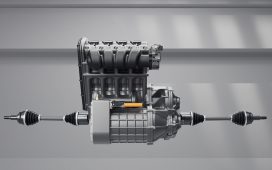The demise of the SUV is inevitable, insists Citroen chief executive officer Vincent Cobée. “The world of SUVs is done,” he claims, although he admits that right now the “numbers are not telling me I’m right.”
Sure enough, such vehicles have accounted for 50 per cent of all new car registrations in Europe for the last few years, but speaking to Auto Express, Cobée points to the emergence of saloon cars “called SUVs just because they’re a bit higher” as evidence for his view. The launch of one such car – the Citroen C4 X – is the venue for our chat with Cobée, who joined the company at the start of 2020.
One major reason for the industry pivoting away from SUVs to cars like the C4 X is aerodynamics, he says. “On a battery EV, if your aerodnaymics are wrong, the penalty in terms of range is massive. You can lose 50 kilometres between good and bad aero, and between an SUV and a sedan you’re talking 60/70/80 kilometres very easily.”
The current solution is to increase the battery size, something we already see in various manufacturers’ ranges – for instance, a BMW iX has a much larger pack than the smaller, slipperier i4. But this won’t always be possible, Cobée reckons. “People will start limiting weight and battery sizes, either through tax, through incenstives, through regulation, through naming and shaming,” he said. France, it’s worth noting, is set to go down the route of taxing vehicles by weight. “The A-segment has been killed by regulation, [and] the D [SUV] segment will be killed by aerodynamicism and weight,” he concluded.
Finally, it’s a simple case of changing perceptions, with SUVs likely regarded to be increasingly problematic in years to come as the climate crisis deepens. “If you live in a big city, five years ago if you drop off your kids with a big SUV you’re a man. Now, if you do this, you’re a ‘terrorist’…”
The weight gain simply isn’t acceptable, says Cobée. “In the 1970s, a car was weighing 700kg. Today an average car is weighing 1300kg. Tomorrow an average car will weigh two tonnes. So we’re using three times more resources to deliver the same service, just to be ‘green’.”
He likens buying a car whose large battery is only occasionally utilised to taking a giant backpack intended for a multi-day hike to the office. “Do you go to the office with that backpack? The answer is no. So why would you go to the office with a car with one tonne of battery?” Instead there should be a greater emphasis of a better charging experience on the move, he says, something Citroen is intending to make easier via route-planning tools and as an interim measure, short-term loans of combustion-powered cars for its EV customers. It has started offering the latter service in France, with plans to expand to other markets.
Citroen is generally moving in a different direction to other manufacturers with its EVs by tending to stick with smaller batteries of 50kWh capacity, while the radical Oli concept of 2022 shows the French company’s commitment to staying light even as it transitions to a fully electric future. Cobée doesn’t deny there’s a risk in moving away from the kinds of cars customers are wanting now, but suggests it could be a bigger problem by failing to change tactics early. “If we stick to ‘SUV boxes’ until 2030 and discover there’s no customer, it’s going to be a hard landing… you don’t want to be the last one to leave the dancefloor.”
Do you agree with this theory? Let us know in the comments section below…











